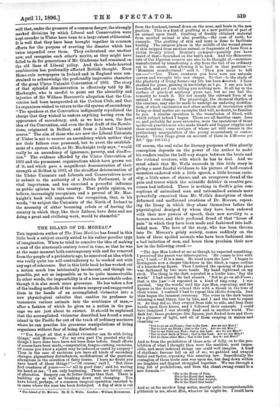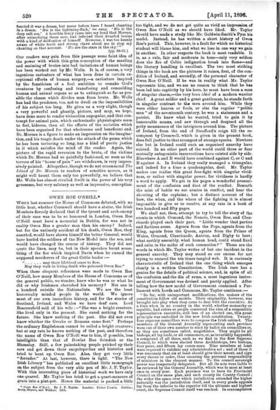THE ISLAND OF DR. MOREAU.*
THE ingenious author of The Time Machine has found in this little book a subject exactly suited to his rather peculiar type of imagination. When he tried to conceive the idea of making a man of the nineteenth century travel in time, so that he was at the same moment both contemporary with and far removed from the people of a prehistoric age, he conceived an idea which was really quite too self-contradictory to be worked out with any sitrt of coherence. But in this little book he has worked out a notion much less intrinsically incoherent, and though im-
possible, yet not so impossible as to be quite inconceivable. In other words, the impossibility is of a less unworkable order. though it is also much more gruesome. He has taken a few of the leading methods of the modern surgery and exaggerated them in the hands of an accomplished vivisector into a new physiological calculus that enables its professor to
transmute various animals into the semblance of man,—
after a fashion of which he gives us a notion in the pas- sage we are just about to extract. It should be explained that the accomplished vivisector described has found a small island in the Pacific far out of the track of ordinary mariners where he can practise his gruesome manipulations of living organisms without fear of being disturbed :—
" You forget all that a skilled vivisector can do with living things,' said Moreau. For my own part I'm puzzled why the things I have done here have not been done before. Small efforts of course have been made,—amputation, tongue-cutting, excisions. Of course you know a squint may be induced or cured by surgery ? Then in the case of excisions you have all kinds of secondary changes, pigmentary disturbances, modifications of the passions, alterations in the secretion of fatty tissue. I have no doubt you have heard of these things ?'—' Of course,' said I. But these foul creatures of yours—'—' All in good time,' said he, waving his hand at me ; I am only beginning. Those are trivial cases of alteration. Surgery can do better things than that. There is building up as well as breaking down and changing. You have beard, perhaps, of a common surgical operation resorted to in cases where the nose has been destroyed. A flap of skin is cut • The Island of Dr. Moreau. By H. G. Wells. London : William Heinemsun. from the forehead, turned down on the nose, and heals in the new position. This is a kind of grafting in a new position of part of an animal upon itself. Grafting of freshly obtained material from another animal is also possible,—the case of teeth, for example. The grafting of skin and bone is done to facilitate healing. The surgeon places in the middle of the wound pieces of skin snipped from another animal, or fragments of bone from a. victim freshly killed. Hunter's cockspur—possibly you have heard of that—flourished on the bull's neck. And the rhinoceros rats of the Algerian zonaves are also to be thought of,—monsters manufactured by transferring a slip from the tail of an ordinary rat to its snout, and allowing it to heal in that position.'— ' Monsters manufactured !' said I. Then you mean to tell me—'— Yes. These creatures you have seen are animals carven and wrought into new shapes. To that—to the study of the plasticity of living forms—my life has been devoted. I have studied for years, gaining in knowledge as I go. I see you look horrified, and yet I am telling you nothing new. It all lay in the surface of practical anatomy years ago, but no one had the temerity to touch it. It's not simply the outward form of an animal I can change. The physiology, the chemical rhythm of the creature, may also be made to undergo an enduring modifica- tion, of which vaccination and other methods of inoculation with. living or dead matter are examples that will, no doubt, be familiar to you. A similar operation is the transfusion of blood, with which subject indeed I began. These are all familiar cases. Less so, and probably far more extensive, were the operations of those mediaeval practitioners who made dwarfs and beggar cripples and. show-monsters ; some vestiges of whose art still remain in the preliminary manipulation of the young mountebank or contor- tionist. Victor Hugo gives an account of them in L'Homme qui Rit." (pp. 108-111.) Of course, the real value for literary purposes of this ghastly conception depends on the power of the author to make his readers realise the half-way stages between the brute and the rational creature, with which he has to deal. And we must admit that Mr. Wells succeeds in this little story in giving a most fearful vividness to his picture of half-created monsters endowed with a little speech, a little human curio- sity, a little sense of shame, and an overgrown dread of the pain and terror which the scientific dabbler in creative pro- cesses had inflicted. There is nothing in Swift's grim con- ceptions of animalised man and rationalised animals more powerfully conceived than Mr. Wells's description of these deformed and malformed creations of Dr. Moreau, repeat- ing the litany in which they abase themselves before the physiological demigod by whom they have been endowed with their new powers of speech, their new servility to a human master, and their profound dread of that "house of pain" in which they have been made and fashioned into half- baked men. The hero of the story, who has been thrown into Dr. Moreau's grisly society, comes suddenly on the huts of these spoiled animals who have been fashioned into, a bad imitation of men, and hears them proclaim their new law in the following creed :— "The Ape Man looked at me as though he expected something-. I perceived the pause was interrogative. 'He comes to live with you,' I said.—' It is a man. He must learn the Law.' I began to distinguish now a deeper blackness in the black, a vague outline of a hunched-up figure. Then I noticed the opening of the place- was darkened by two more heads. My hand tightened on my stick. The thing in the dark repeated in a louder tone, 'Say the words.' I had missed its last remark. 'Not to go on all-Fours ; that is the Law '—it repeated in a kind of sing-song. I was puzzled. Say the words,' said the Ape Man, repeating, and the figures in the doorway echoed this with a threat in the tone of their voices. I realised I had to repeat this idiotic formula. And then began the meanest ceremony. The voice in the dark began intoning a mad litany, line by line, and I and the rest to repeat it. As they did so, they swayed from side to side, and beat their hands upon their knees, and I followed their example. I could have imagined I was already dead and in another world. The dark hut, these grotesque dim figures, just flecked here and there by a glimmer of light, and all of them swaying in unison and chanting :— 'Not to go on all-Fours; that lithe Law. Are we not Men P' 'Not to suck up Drink ; that,, the taw. Are we not Men ? ' 'Not to eat Flesh nor Flab; that is the Law. Are we not Men?' ' Not to claw Bark of Trees; that lathe Law. Are we not Men P
Not to chase other Men ; that is the Law. Are sy.! not Men P '
And so from the prohibition of these acts of folly, on to the pro- hibition of what I thought then were the maddest, most impos- sible, and most indecent things one could well imagine. A kind of rhythmic fervour fell on all of us; we gabbled and swayed faster and faster, repeating this amazing law. Superficially the contagion of these brute men was upon me, but deep down within me laughter and disgust struggled together. We ran through a long list of prohibitions, and then the chant swung round to a new formula :- 'His tithe House of Pain. His is the Hand that makes. His is the Hand that wounds. His tithe Hand that heals.'
And so on for another long series, mostly quite incomprehensible gibberish tp me, about Him, whoever he might be. I could have fancied it was a dream, but never before have I heard chanting In a dream. His is the lightning-flash,' we sang. 'His is the deep salt sea.' A horrible fancy came into my head that Moreau, after animalising these men, had infected their dwarfed brains with a kind of deification of himself. However, I was too keenly aware of white teeth and strong claws about me to stop my chanting on that account. 'His are the stars in the sky.'"
(pp. 88-91.)
Our readers may gain from this passage some faint idea of the power with which this grim conception of the mauling and maiming of brutes into bad imitations of human beings has been worked out by Mr. Wells. It is, of course, a very ingenious caricature of what has been done in certain ex- ceptional efforts of human surgery,—a caricature inspired by the fanaticism of a foul ambition to remake God's creatures by confusing and transfusing and remoulding human and animal organs so as to extinguish so far as pos- sible the chasm which divides man from brute. Mr. Wells has had the prudence, too, not to dwell on the impossibilities of his subject too long. He gives us a very slight, though a very powerful and ghastly, picture, and may, we hope, have done more to render vivisection unpopular, and that con- tempt for animal pain, which enthusiastic physiologists seem to feel, hideous, than all the efforts of the societies which have been organised for that wholesome and beneficent end. Dr. Moreau is a figure to make an impression on the imagina- tion, and his tragic death under the attack of the puma which he has been torturing so long, has a kind of poetic justice in it which satisfies the mind of the reader. Again, the picture of the rapid reversion to the brute, of the victims which Dr. Moreau had so painfully fashioned, so soon as the terrors of his " house of pain" are withdrawn, is very impres- sively painted. Altogether, though we do not recommend The Island of Dr. Moreau to readers of sensitive nerves, as it might well haunt them only too powerfully, we believe that Mr. Wells has almost rivalled Swift in the power of his very gruesome, but very salutary as well as impressive, conception.



































 Previous page
Previous page